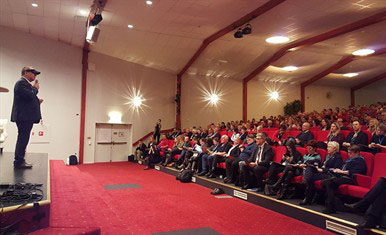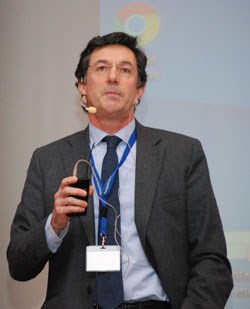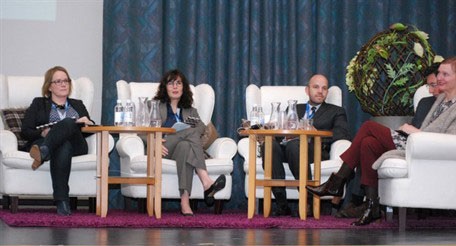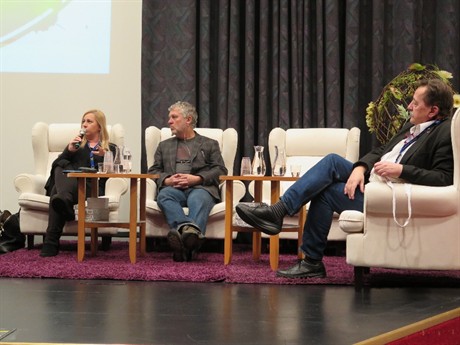The Europaforum North Sweden XXII in North Sweden, Piteå
At the twenty-second session of the Europaforum North Sweden (EFNS) in Piteå, the four northernmost counties in northern Sweden adopted five common policy positions on circular economy, reception of migrants, cohesion policy, wind power and biomass

This year's Europaforum North Sweden focused on how the four northern counties, Norrbotten, Västerbotten, Jämtland-Härjedalen and Västernorrland, can have an impact on important issues for northern Sweden in European policies, and further prepare for the next EU programme period.
The Europaforum North Sweden was opened by the Chairman of the EFNS, Erik Bergkvist, also a member of the Regional Executive Board in Västerbotten, and Maria Stenberg, county council Chairwoman for Norrbotten, who welcomed the participants to Piteå in Norrbotten. Interest in this year’s EFNS conference was considerable, bringing together nearly 300 politicians and officials, marking a new record for the number of participants compared with previous years.
- Policy decisions in the EU are affecting the north of Sweden's development. Therefore, we need to join forces in northern Sweden through the EFNS. The EU is large and there are many actors wishing to participate in shaping the future of Europe; therefore, it is essential that we gather together in the north, said Maria Stenberg (S), county council Chairwoman for Norrbotten.
The theme of this year's Europaforum was "Future European Policy: an opportunity for northern Sweden". Several important issues were raised, such as the demographic challenge, the need for competence, the supply of expertise and mismatch of skills, the reception of migrants, the Arctic, transportation to the north and the future of Europe, among other issues.
The programme gathered speakers from the European Commission, the European Parliament, researchers, representatives from northern Sweden, representatives from Canada, the team from the Organisation for Economic Cooperation and Development (OECD), the Swedish Agency for Economic and Regional Growth, the Swedish Government, North Sweden European Office and many more.
External and future monitoring of the Swedish and European perspective
The OECD is compiling a report which will analyse northern Sweden, Norway and Finland and their common challenges; and will further provide recommendations for development. In the same week, the OECD team visited Sweden’s four northern counties and met with stakeholders in order to gather data for the forthcoming report on challenges and opportunities in our northern regions.
Mikel Landabaso, Director, Urban and Territorial Development, DG Regio, European Commission in Brussels, also participated in the EFNS conference, and presented the EU’s common strategies and partnerships that will lead to more jobs and regional growth through smart specialization. The key was to identify areas where the region could potentially be more competitive than other countries or regions, which he referred to as "the process of entrepreneurial discovery".

- Part of the solution is to focus together on the common problems, so as to continue to be able to meet the challenges. The north of Sweden should continue this path on working together with other regions, said Mr Landabaso.
Not many regions in Europe are similar to the north of Sweden; however, northern Sweden and Canada share a number of common challenges, including long distances, cold climate and a negative demographic development. Marie-Chantal Girard, from a state agency for the development of the Quebec region, was also participating in the OECD study mission, and provided the team with a view of the situation in Quebec, Canada, and how the actors there work with regional development.
- We are different actors who have come to the same conclusions about what is important for our development. We must work together and not in parallel to reach our full potential, said Marie-Chantal Girard.
Come to northern Sweden and take your ideas and knowledge with you
The EU needs new answers in order to meet the challenge of creating new jobs. An increasing number of people are moving into the cities; this is not only a challenge for northern Sweden, but throughout Europe. It is important that north Sweden improves so as to make the region more attractive, through infrastructure developments and by taking advantage of the demand for and supply of competence, and the matching of skills. It is also important to see new opportunities such as northern Sweden's potential in tourism; for example, there is a large market in the sector of tourism for senior citizens which is as yet unexplored, said José Enrique Garcilazo, Head of Unit for Rural and Regional Development at the OECD.
- Many women leave the region. To get people to stay but also move into the region, it is important that the region develops so as to offer young people new opportunities and good conditions for their families, said Marie-Chantal Girard.

Global migration flows - Panel discussion on Europe's common challenges
During the conference Christopher Tamas, Permanent Secretary at the Delegation for Migration Studies, spoke about the current refugee situation. The increased migration in Europe is mainly due to the war in Syria, from which 4.7 million people have fled. In 2015, the EU received 1 million migrants applying for asylum.
- In Hungary, they built high fences to keep refugees out, which led to drastic methods for the refugees who wanted to enter the EU, said Christopher Tamas.
Gunilla Nordlöf, General Director for the Swedish Agency for Economic and Regional Growth, said in her speech on the first day that an increasing number of immigrants can be seen as both a challenge and a solution. Europe must together adopt strategies that are long-term, to faster integrate immigrants; she added that immigration can be the solution to the skills shortage that exists in Sweden and Europe.
Panel discussion on Europe's common challenges
In the closing session of the Europaforum conference, the current situation and future of Europe were debated by MEP Jens Nilsson Social Democrats, Peter Eriksson of the Green Party, Anna Ibrisagic, former MEP for the Moderates, and Ewa May Karlsson, member of the European Committee of Regions and reporter for Västerbotten. The debate tackled the European crisis, which was a result of growing nationalism.
- We are in a situation where the least democratic forces are being chosen democratically. Nationalism is a major threat, not only in Sweden but throughout Europe, said Anna Ibrisagic, who has 10 years’ experience of work in the European Parliament.

EFNS: the five common policy positions
The EFNS is a meeting place and a knowledge arena where EU policies are analysed and discussed with regard to how they affect northern Sweden. During the EFNS conference a number of policy positions for the four northern counties in Sweden were discussed and agreed on, in line with common objectives and lines of EU policy.
- We have adopted five clear policy positions for a better EU policy for northern Sweden, said Erik Bergkvist (S), member of the Regional Executive Board in Västerbotten and Chairman of the EFNS. He further said: we show great strength by working together across the parties and county borders on common political positions.
At this 22nd conference in Piteå, the Europaforum agreed on five common positions:
• EFNS welcomes a coherent package on the circular economy;
• EFNS calls for a common and sustainable refugee reception throughout Europe;
• EFNS agrees on initial views on cohesion policy after 2020;
• EFNS expresses views on wind power within Horizon 2020, in the last programme period 2018-2020 and beyond;
• EFNS expresses comments on the issue of cascading use of biomass.
Parallel seminars were held on EU-related perspectives on the infrastructure in the north, the Arctic as an opportunity for northern Sweden, EU's investment policy and future cohesion regional policy, and the demographic challenges. Participants were given the opportunity to talk about the different positions with the political reporters of the EFNS, and discuss them before a decision-making process.
/Martha Bahta
(Translation: Aida Mehrazin)
